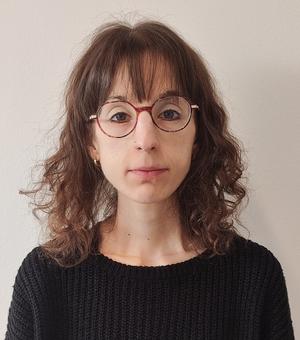Cécile Jullion
Please tell us about your research project.
Currently in the 4th year of my PhD at the Université Grenoble-Alpes (UGA) in France, I’m researching Cicero’s use of Greek in his epistolary exchanges, under the joint supervision of Florian Barrière (Professor of Latin Language and Literature, Litt&Arts Laboratory, UGA) and Julie Sorba (Associate Professor HDR in Language Science, Lidilem Laboratory, UGA).
My aim in studying the Greek words and word groups in the Letters (the title of the work that brings together all the letters written by the 1st century BC Roman orator, lawyer and politician, and on which my work is based) is to establish a morpho-syntactic typology and, ultimately, to characterize Cicero’s epistolary prose (style) by studying its relationship to Greek language and culture. In parallel with this work of categorizing “Cicero’s Greek”, I’m designing the other two parts of my thesis: the first part or “state of the art”, which aims to establish a complete overview of the knowledge we possess on this subject, and the second or “methodology”, which, as its name suggests, is the description of how I have collected, classified and quantitatively presented all my data. It’s to develop and considerably enrich these two parts of my thesis that I’m carrying out this fellowship.
Could you please tell us a bit more about your scholarship/exchange programme?
I was awarded this research grant thanks to a partnership between MaCI (Maison de la Création et de l’Innovation, Université Grenoble-Alpes) and the Maison Française d’Oxford as part of the GATES MaCI project to support outgoing international mobility for doctoral students. This scheme is designed to encourage and support the outgoing mobility of doctoral students for stays of between two weeks and two months in connection with their doctoral research in the humanities and social sciences. There is only one call for applications per academic year, usually in the autumn, in October. Applications must be submitted by the end of December, and shortlisted candidates are auditioned in January and February. If the auditioned candidate is selected, he can carry out his mobility between March 1st and December 31stof the current year.
Applications are selected and mobility grants are awarded based on the following three criteria: the scientific excellence of the application, the relevance of the mobility and the relevance of the mobility to the scientific project of the Maison Française d’Oxford. In a spirit of reciprocity, at the end of their research stay each candidate is required to write a one or two pages report on their research in Oxford, giving an assessment of their stay.
First impressions of Oxford/the University?
As soon as I arrived in Oxford, and apart from the rain that was pouring down (but I had prepared for that!), I was struck by the University’s organization into different Colleges. Oxford is not a tourist city like London, for example, but a veritable machine to produce knowledge; it’s not the University that has developed within the city, but quite the opposite: it’s the city that has had to adapt to the university environment. It’s very impressive, and a little unsettling at first.
I was also surprised by the architecture, in particular the Gothic style that dominates the city and gives it its nickname of “City of Dreaming Spires”, as one of the residents of the Maison Française d’Oxford told me during my stay. A major building, and one to which the residents of the Maison Française d’Oxford have free and privileged access, is the Bodleian Library, one of the richest libraries in the world. I must admit I was very impressed when I first used my reader’s card at the Bodleian Library, and even more so when the little button on the security scanner turned green and the barrier opened! It’s a wonderful experience, and all the conditions are there for you to do your research properly and efficiently.




